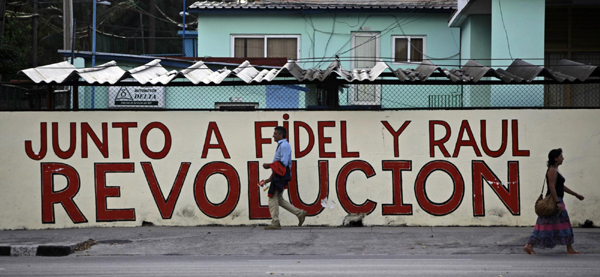
 |
|
People walk beside a mural in Havana Jan 29, 2012. Cuba's Communist Party considered reforms last weekend that could impose term limits on its leaders in what would be a striking change on an island that Fidel Castro ruled for 49 years and was succeeded by his brother. [Photo/Agencies] |
HAVANA - The unprecedented national conference of Cuba's Communist Party ended on Sunday, as President Raul Castro called for political term limits and fight against corruption in the Caribbean island.
At the two-day follow-up of the ruling party's Sixth Congress last April, Castro urged to set up a limit of two five-year political terms to the country's officeholders, including the president.
The 80-year-old president tabled the proposal last year with an aim to encourage younger officials and gradually renew leadership in the government and the Communist Party.
Addressing to more than 800 delegates at the end of the national conference, the leader reassured that the government would continue a "ceaseless fight" against corruption.
"To win the battle against corruption, we should first stop it and then shatter it without any hesitation," he said, adding that the government would disclose details about any cases under investigation.
Raul Castro, who succeeded his brother Fidel in 2006 and formally took office two years later, established the General Comptroller Office to deal with economic crimes and inefficiency in domestic companies.
The historic meeting came amid the country's nationwide economic reforms which allow Cubans to open small and private businesses and reduce employees in bloated state-owned companies.
The country in September also eased a 50-year-old ban on house and auto sales among individuals.
Castro asked to verify the implementation of the reform resolutions approved at the last year's congress aiming at boosting the country's stagnant economy.
"I have the duty to warn, once again, that we should not believe that the resolutions are a magical solution to all our problems."
"There are no resolutions without mistakes, but the most important thing is to fix them," he noted.
As the ruling party's first secretary, Castro said it was necessary to create an environment of maximum confidence as well as conditions for the most sincere exchange of opinions.
All opinions should be given due respect, he said, calling for the media to be responsible in the debate with strict veracity and objectivity.
In the closing speech, Castro slammed the "brutal U.S. campaigns" against Cuba, stressing that they would not affect the Revolution or the Cuban people "who will continue to perfect socialism."
He also said the Cuban Communist Party would continue as the only recognized political party in the country.
"Cuba will never renounce its single political party policy, as imperialism pretends, because that decision will lead to the defeat of the Revolution and will sacrifice people's unity."
He rejected the possibility of a multi-party model in Cuba. "We have chosen, with the participation and support of the Cuban people, to follow the one-party option."
"What we have to do is to promote wider democracy in our society and inside our party," he added.
The Cuban Revolution was led by the country's former President Fidel Castro in 1953 to fight the regime of Fulgencio Batista, who was finally ousted in January 1959.